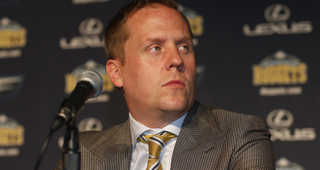Ever since the day Carmelo Anthony boarded a plane for New York and left his Nuggets jersey behind, Denver has been in the asset management game. After netting a haul of four starting caliber players and a first round pick in the Anthony trade in February of 2011, the Nuggets have somehow managed to continuously juggle quality rotation players on and off their roster for the five years since.
A few players who have come and gone in that time include Ty Lawson, Kosta Koufos, Timofey Mozgov, JaVale McGee, Raymond Felton, Andre Iguodala, J.R. Smith, Nate Robinson, D.J. Augustine, Jameer Nelson, Andre Miller, Al Harrington, Aaron Afflalo, Jordan Hamilton, Rudy Fernandez, Nene, Corey Brewer and Evan Fournier.
In that time, Denver has been uncompetitive outside of a funky George Karl-led 55-win 2012 team. They’ll come into 2016 with perhaps their deepest team yet, but this time it will include promising young talent. The Nuggets are trying to change course from being a bad team to being a good team, and they might have more options than any other franchise in the NBA in that pursuit.
Daryl Morey and the Houston Rockets have been hailed as the NBA kings of asset collection. That title was only applied to them, however, when they were able to land a superstar in James Harden. They cashed in. The Nuggets, on the other hand, have continued to stockpile in that time. They’ve juggled a handful of quarters and might be ready get a dollar.
Promising youth and hordes of assets are a rare combination, because decent assets usually win you enough games to prevent you from landing a top-five draft pick. But by drafting Emmanuel Mudiay seventh last year and, more importantly, Nikola Jokic in the second round in 2014, the Nuggets have landed true developmental building blocks. Minnesota seems to have everyone’s favorite young core, but the combination of Mudiay and Jokic, and intriguing rookie first-rounders Jamal Murray and Malik Beasley (and even third-year player Gary Harris), isn’t miles behind the Wolves.
So why did a deep team heading in a promising direction offer $50 million to Dwyane Wade? Denver has youth and professional, well-liked veterans like Wilson Chandler, Jameer Nelson and Will Barton to mentor them. Mike Malone looks to be in for the long haul after constant turmoil from George Karl and Brian Shaw. The Nuggets have a chance for a little roster continuity for the first time in years. Conservative logic would suggest Denver simply stand pat and let Mudiay and Jokic develop into stars.
That’s always a possibility, but at some point the culture in Denver has to change. Eventually they have to win. Youth development can bring those wins, but as good as Mudiay and Jokic are (and Jokic is very good) they are not surefire foundational superstars like Westbrook and Durant, or Karl-Anthony Towns. The opportunity to play with Wade would have given Mudiay and Jokic and Beasley and Murray and Harris the opportunity to do what Wade himself did: develop his skills while competing in meaningful games. The swing for the 34-year old Dwyane Wade was a pronouncement that the Nuggets think they can win now and later.
That possibility did not exactly go out the window when Wade eventually rejected them—or perhaps just used them for leverage against Miami and Chicago. The Nuggets' roster is filled with trade chips. And considering the youth already on their hands, they’d likely be willing to part ways with first-round picks in exchange for the right player.
Let’s look at the Nuggets potential depth chart as it stands:
Mudiay/Jameer Nelson
Gary Harris/Jamal Murray/Malik Beasley/Mike Miller
Wilson Chandler/Will Barton
Danilo Gallinari/Kenneth Faried/Darrell Arthur
Jokic/Jusuf Nurkic/Joffrey Lauvergne
That’s a lot of quality players. As fun as a deep team can be, all those players are unlikely to be able to make an impact on the same team. They are simply too deep to take advantage of all their available contributors.
Denver might not actively shop any one player this season—though Faried could end up on the trade block—they would be smart to keep their eyes open. Unloading assets is a scary proposition because acquiring the wrong player can set a team’s trajectory back years, but the right move can jumpstart a franchise.
The Nuggets could potentially land Kevin Love in a deal that looks something like this:
Denver receives:
Kevin Love
Cleveland receives:
Danilo Gallinari
Jusuf Nurkic
(one of either Murray or Beasley)
They might be able to acquire Paul Milsap by swapping Gallinari and Barton.
Or maybe they could flip Faried, Wilson Chandler and Barton for Eric Bledsoe and Tyson Chandler.
Perhaps none of these trades will be available to them. But unforeseen impact players are likely to become possibilities. A lot of big contracts are being signed this summer and franchises may quickly experience buyer’s remorse within their constantly shifting plans. If Chandler Parsons, Nicolas Batum, Bradley Beal, or DeMar DeRozan, turn out to be a little less than their investors anticipated, unloading those contracts for value might make them change course. Denver has a lot to offer and could use players that immediately move the needle.
They even have the less likely possibility of moving Mudiay and Jokic in a package for a superstar. They reportedly turned down a trade for Blake Griffin last year centered around Jokic and Gallinari, but what if a struggling Thunder team whispers to them about moving Russell Westbrook? Would Mudiay, Jokic, Faried and a first round pick be enough to land Westbrook for a half-year rental? Would that be worth it?
It’s impossible to predict what might become available as the season progresses. All a team can do is be prepared to capitalize on such opportunities. As crazy and far removed as it seems, it might be time for the dividends from the Carmelo Trade—the move that triggered their asset collection—to finally pay off.



